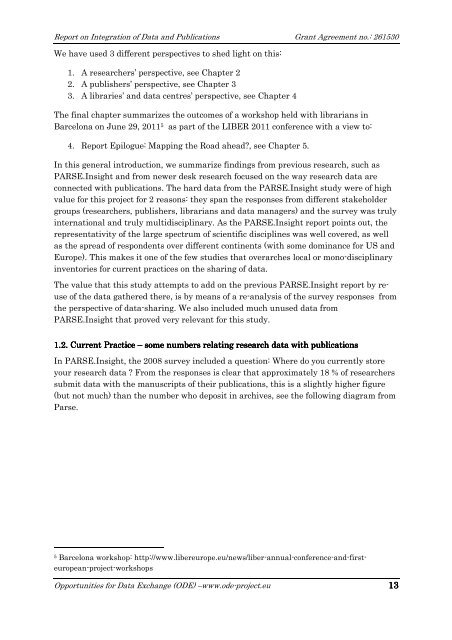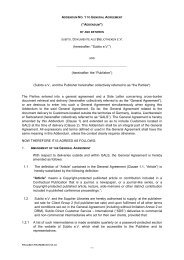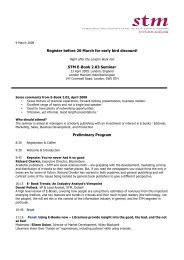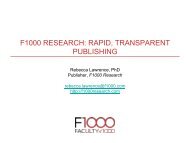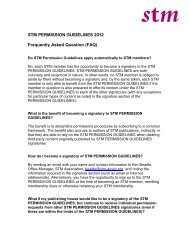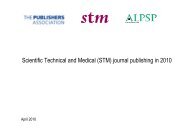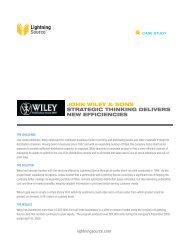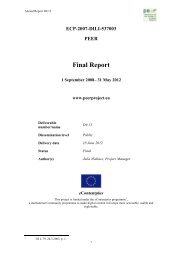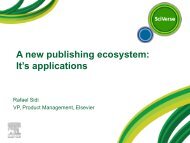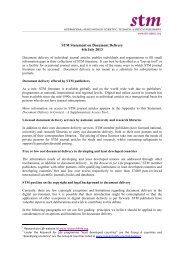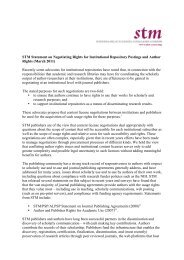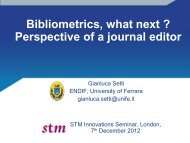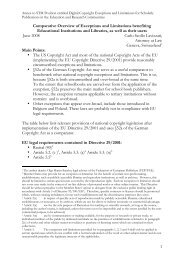Integration of Data and Publications - Alliance for Permanent Access
Integration of Data and Publications - Alliance for Permanent Access
Integration of Data and Publications - Alliance for Permanent Access
You also want an ePaper? Increase the reach of your titles
YUMPU automatically turns print PDFs into web optimized ePapers that Google loves.
Report on <strong>Integration</strong> <strong>of</strong> <strong>Data</strong> <strong>and</strong> <strong>Publications</strong> Grant Agreement no.: 261530<br />
We have used 3 different perspectives to shed light on this:<br />
1. A researchers’ perspective, see Chapter 2<br />
2. A publishers’ perspective, see Chapter 3<br />
3. A libraries’ <strong>and</strong> data centres’ perspective, see Chapter 4<br />
The final chapter summarizes the outcomes <strong>of</strong> a workshop held with librarians in<br />
Barcelona on June 29, 2011 5 as part <strong>of</strong> the LIBER 2011 conference with a view to:<br />
4. Report Epilogue: Mapping the Road ahead?, see Chapter 5.<br />
In this general introduction, we summarize findings from previous research, such as<br />
PARSE.Insight <strong>and</strong> from newer desk research focused on the way research data are<br />
connected with publications. The hard data from the PARSE.Insight study were <strong>of</strong> high<br />
value <strong>for</strong> this project <strong>for</strong> 2 reasons: they span the responses from different stakeholder<br />
groups (researchers, publishers, librarians <strong>and</strong> data managers) <strong>and</strong> the survey was truly<br />
international <strong>and</strong> truly multidisciplinary. As the PARSE.Insight report points out, the<br />
representativity <strong>of</strong> the large spectrum <strong>of</strong> scientific disciplines was well covered, as well<br />
as the spread <strong>of</strong> respondents over different continents (with some dominance <strong>for</strong> US <strong>and</strong><br />
Europe). This makes it one <strong>of</strong> the few studies that overarches local or mono-disciplinary<br />
inventories <strong>for</strong> current practices on the sharing <strong>of</strong> data.<br />
The value that this study attempts to add on the previous PARSE.Insight report by reuse<br />
<strong>of</strong> the data gathered there, is by means <strong>of</strong> a re-analysis <strong>of</strong> the survey responses from<br />
the perspective <strong>of</strong> data-sharing. We also included much unused data from<br />
PARSE.Insight that proved very relevant <strong>for</strong> this study.<br />
1.2. Current Practice – some numbers relating research data with publications<br />
In PARSE.Insight, the 2008 survey included a question: Where do you currently store<br />
your research data ? From the responses is clear that approximately 18 % <strong>of</strong> researchers<br />
submit data with the manuscripts <strong>of</strong> their publications, this is a slightly higher figure<br />
(but not much) than the number who deposit in archives, see the following diagram from<br />
Parse.<br />
5 Barcelona workshop: http://www.libereurope.eu/news/liber-annual-conference-<strong>and</strong>-firsteuropean-project-workshops<br />
Opportunities <strong>for</strong> <strong>Data</strong> Exchange (ODE) –www.ode-project.eu 13


